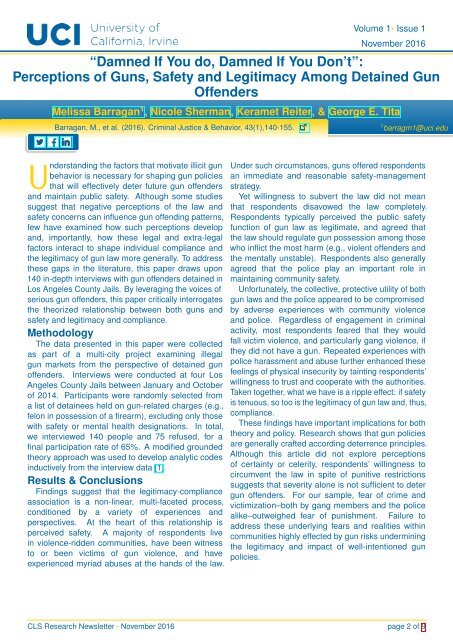Criminology Law & Society Research Newsletter
owcwytp
owcwytp
Create successful ePaper yourself
Turn your PDF publications into a flip-book with our unique Google optimized e-Paper software.
Volume 1• Issue 1<br />
November 2016<br />
“Damned If You do, Damned If You Don’t”:<br />
Perceptions of Guns, Safety and Legitimacy Among Detained Gun<br />
Offenders<br />
Melissa Barragan 1 , Nicole Sherman, Keramet Reiter, & George E. Tita<br />
Barragan, M., et al. (2016). Criminal Justice & Behavior, 43(1),140-155.<br />
1 barragm1@uci.edu<br />
Understanding the factors that motivate illicit gun<br />
behavior is necessary for shaping gun policies<br />
that will effectively deter future gun offenders<br />
and maintain public safety. Although some studies<br />
suggest that negative perceptions of the law and<br />
safety concerns can influence gun offending patterns,<br />
few have examined how such perceptions develop<br />
and, importantly, how these legal and extra-legal<br />
factors interact to shape individual compliance and<br />
the legitimacy of gun law more generally. To address<br />
these gaps in the literature, this paper draws upon<br />
140 in-depth interviews with gun offenders detained in<br />
Los Angeles County Jails. By leveraging the voices of<br />
serious gun offenders, this paper critically interrogates<br />
the theorized relationship between both guns and<br />
safety and legitimacy and compliance.<br />
Methodology<br />
The data presented in this paper were collected<br />
as part of a multi-city project examining illegal<br />
gun markets from the perspective of detained gun<br />
offenders. Interviews were conducted at four Los<br />
Angeles County Jails between January and October<br />
of 2014. Participants were randomly selected from<br />
a list of detainees held on gun-related charges (e.g.,<br />
felon in possession of a firearm), excluding only those<br />
with safety or mental health designations.<br />
In total,<br />
we interviewed 140 people and 75 refused, for a<br />
final participation rate of 65%. A modified grounded<br />
theory approach was used to develop analytic codes<br />
inductively from the interview data [1].<br />
Results & Conclusions<br />
Findings suggest that the legitimacy-compliance<br />
association is a non-linear, multi-faceted process,<br />
conditioned by a variety of experiences and<br />
perspectives. At the heart of this relationship is<br />
perceived safety. A majority of respondents live<br />
in violence-ridden communities, have been witness<br />
to or been victims of gun violence, and have<br />
experienced myriad abuses at the hands of the law.<br />
Under such circumstances, guns offered respondents<br />
an immediate and reasonable safety-management<br />
strategy.<br />
Yet willingness to subvert the law did not mean<br />
that respondents disavowed the law completely.<br />
Respondents typically perceived the public safety<br />
function of gun law as legitimate, and agreed that<br />
the law should regulate gun possession among those<br />
who inflict the most harm (e.g., violent offenders and<br />
the mentally unstable). Respondents also generally<br />
agreed that the police play an important role in<br />
maintaining community safety.<br />
Unfortunately, the collective, protective utility of both<br />
gun laws and the police appeared to be compromised<br />
by adverse experiences with community violence<br />
and police. Regardless of engagement in criminal<br />
activity, most respondents feared that they would<br />
fall victim violence, and particularly gang violence, if<br />
they did not have a gun. Repeated experiences with<br />
police harassment and abuse further enhanced these<br />
feelings of physical insecurity by tainting respondents’<br />
willingness to trust and cooperate with the authorities.<br />
Taken together, what we have is a ripple effect: if safety<br />
is tenuous, so too is the legitimacy of gun law and, thus,<br />
compliance.<br />
These findings have important implications for both<br />
theory and policy. <strong>Research</strong> shows that gun policies<br />
are generally crafted according deterrence principles.<br />
Although this article did not explore perceptions<br />
of certainty or celerity, respondents’ willingness to<br />
circumvent the law in spite of punitive restrictions<br />
suggests that severity alone is not sufficient to deter<br />
gun offenders. For our sample, fear of crime and<br />
victimization–both by gang members and the police<br />
alike–outweighed fear of punishment. Failure to<br />
address these underlying fears and realities within<br />
communities highly effected by gun risks undermining<br />
the legitimacy and impact of well-intentioned gun<br />
policies.<br />
CLS <strong>Research</strong> <strong>Newsletter</strong> • November 2016 page 2 of 9


